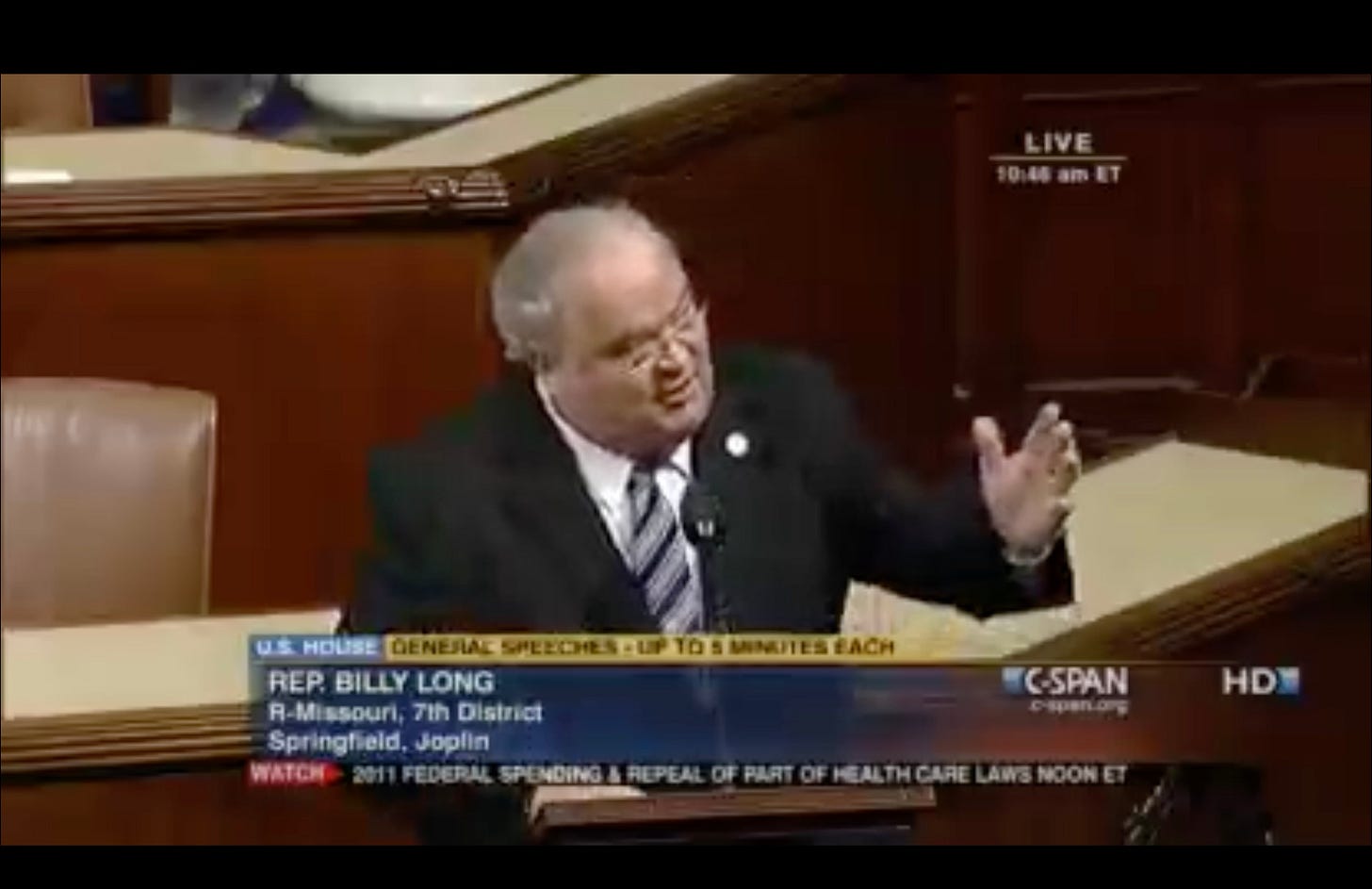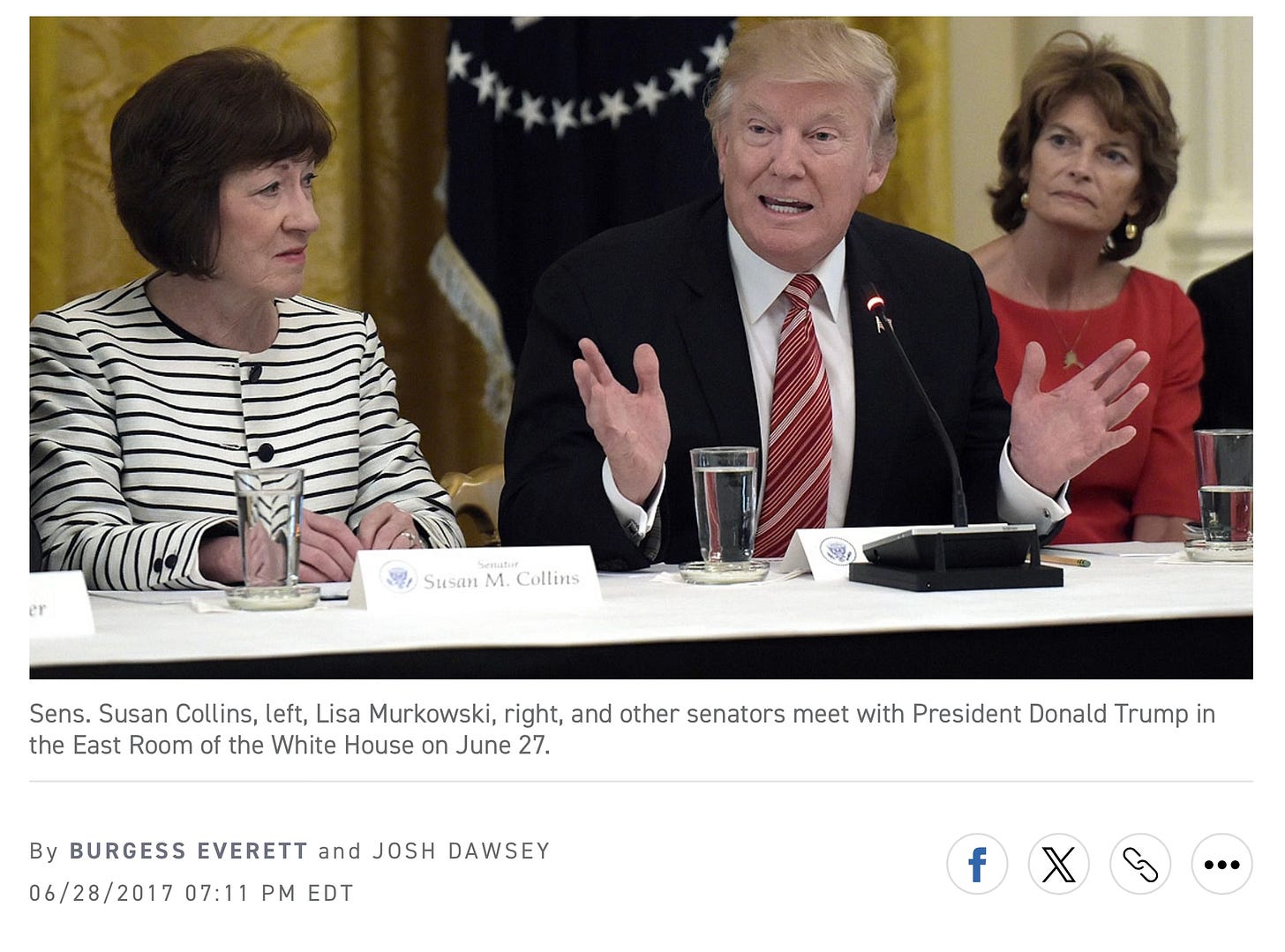Susan Collins is Bad at Her Job
The final Federal Correspondent explains why.
A note from Crash: As I mentioned in this missive earlier this week, I’m super busy on a book and a new true crime podcast and have decided to suspend the expanded Crash Report, which means I will no longer be publishing our Federal Correspondent Amy Fried’s musings on the current Fall of Rome. Luckily, she’s started her own substack, called Political Sightlines. I highly recommend you subscribe sooner rather than later!
Susan Collins has been Maine’s senior senator a very long time, but that doesn’t mean she’s good at some critically important parts of her job. In fact, she’s pretty bad at judging the character and quality of potential government officials.
Like other senators, for instance, Collins votes on presidential nominees. She has long claimed her votes are based on qualifications. Collins, though, voted for people Trump put forward who were clearly not suited for the job.
Take former Missouri Congressman Billy Long. Collins backed him to be the Commissioner of the Internal Revenue Service. So if skills are what matter to Collins, you’d expect this nominee to have some expertise with income tax. Perhaps he was a lawyer, accountant or public policy wonk? Nope. Long is not a beancounter. His work experience included being an auctioneer, a part-time realtor and a talk radio host for KWTO, a 5,000 watt AM station in Springfield, Missouri.
In other words, the man Trump nominated to the IRS boss of 85,000 employees and an annual budget of over $12 billion has ZERO experience overseeing any large organization.
However, when Long ran for Congress he bragged about being the "best auctioneer in the Ozarks for seven years in a row.” And during his stint in Congress, he actually sponsored legislation to abolish the IRS. Then, after leaving Congress, as CBS reports, “he touted his work helping businesses use the Employee Retention Tax Credit, a credit that the IRS has flagged for its high rate of fraud.”
Long’s beyond-thin resume for leading the IRS contrasts with past commissioners. Look at Charles Rettig, who Trump nominated during his first Presidential term. Rettig, who was confirmed, is a lawyer who earned a master’s degree from the top tax law program in the country, NYU Law. Also, he practiced tax law for 36 years. And Rettig had been President of the American College of Tax Counsel, vice-chair of the Taxation Section of the American Bar Association and chair of the IRS Advisory Council. So, yeah, Rettig was qualified.
Luckily, Billy Long didn’t last long, staying in that job just 53 days after he was sworn in. The stink of Collins’ vote for him, though, should linger for a long time, reminding voters of her rank incompetence and apparent appreciation of the fine art of auctioneering.
Even worse is how Collins handled the nomination of nutcase Robert F. Kennedy Jr. for Secretary of Health and Human Services. By this point, everybody knows Kennedy is an anti-science crank and wellness fraudster with brain fog because, as he explained, there was “a worm that got into my brain and ate a portion of it and then died.” It’s no secret that RFK isn’t a doctor or public health expert or scientific researcher or even someone with any management background. And despite being warned by doctors and scientists in Maine and across the nation, Collins voted for this lunatic.
Predictably, RFK’s tenure as top medicine man has been a disaster. The National Institutes of Health (NIH) slashed cancer research. Kennedy fired experts on the vaccine advisory committee, plus he ordered the NIH to pull back from vaccines. And he’s been super hostile to using mRNA vaccines, even as scientists have been on the verge of using this biomedical technology to stop pancreatic cancer. Measles outbreaks have spiked too. Many CDC employees are furious at Kennedy and we should be, too -- at him and at anyone crazy enough to think he should have this or any cabinet position.
Once again, Collins’ colleague Angus King knew better and voted against the crank without qualifications. In a floor speech, King spoke first about his own experience as a governor and said “as a former executive, I believe the executive should have the ability to choose the team that they want, to choose their advisors.” But, King said, senators should also use their judgments because, at a minimum “the nominee must be manifestly qualified and not hostile to the mission of the agency to which they've been appointed.”
King, unlike Collins, competently applied those standards to RFK, Jr., saying the nominee was clearly hostile to the part of government he was slated to run, due to his long history of promoting junk science and stirring up hatred against scientists, medical professionals and other experts.
As King rightly concluded,“This man is not only unqualified, he's anti-qualified. He's a danger.” And King summed up the horrid reality of the current circus in Washington: lot of senators only voted for Kennedy because Trump pressured them. “Everybody in this body knows he's not qualified,” King proclaimed. “Everybody in this body knows he has no business anywhere near this position. But here we are. We're going to take a vote. Unfortunately, it will probably be on a party-line basis.”
Soon we’ll see how Collins does in questioning and voting on E.J. Antoni, Trump’s nominee to lead the Bureau of Labor Statistics. Antoni is an utter hack -- and that’s according to conservative economists. Jessica Riedl, a former Heritage Foundation research fellow now at the conservative Manhattan Institute, said articles and online posts by Antoni “are probably the most error-filled of any think tank economist right now.” Or consider the words of Jeremy Horpedahl of the libertarian Cato Institute who said Antoni “either massively misunderstands labor market data, or he is willing to lie repeatedly about after being corrected by dozens of economists.” Stan Veuger of the American Enterprise Institute, often described as a center-right think tank, is equally dismissive. Veuger called Trump’s BLS pick “utterly unqualified and as partisan as it gets.’” In one pathetic example, Antoni wrongly claimed a stat about pre-tariff import prices proved tariffs didn’t raise prices. And this is who MAGA wants running a government department.
Despite the nominee’s lack of knowledge, qualifications and Antoni’s presence at the January 6 insurrection, Collins’ track record on nominations makes it impossible to know how Collins will vote. That, by itself, demonstrates that Collins is not competent at this key senatorial task.
Also discomforting is how Collins doesn’t seem to understand what the BLS does. After Trump fired the highly qualified head of BLS for reporting weak job numbers, Collins said the BLS “has a mixed record in its predictions but should not be subject to political pressure.”
Predictions, of course, are theories of what will happen in the future. However, that’s not what the BLS does. The bureau releases economic numbers about what happened in the past. Moreover, revisions and adjustments to BLS numbers are routine because some data comes in after the monthly deadline. Collins criticizing the nonexistent “predictions” of the BLS either shows incredible ignorance or is a clumsy attempt to both-sides the autocrat’s plan to shape statistics to suit his narrative. Or both.
What is Collins good at?
Some people say that Collins’ offices deliver good constituent services. And she certainly has an aggressive press operation. And, in the past, Collins was known for bringing home the bacon for Maine. In her last campaign, she bragged how, if elected, she would become Chair of the Senate Appropriations Committee, a position from which she could help bring even more federal monies to Mainers.
However, Collins doesn’t have the budgetary power she promised. She gave it away. First by voting for Project 2025 honcho Russell Vought to be the head of the White House Office of Management and Budget. Vought is also a big fan of arguably illegal presidential recissions, D.C.-talk for when a president decides not to spend money appropriated by Congress.
Then, in mid-July, Collins again sided with Trump and Vought and voted against her own budgetary power. As the Portland Press Herald explained “Collins voted against a Democratic proposal to require that rescissions go through the appropriations process — which would give lawmakers more influence over the final outcome — rather than heading to the Senate floor, where options for amendments are limited.”
Collins simultaneously claimed she actually wanted her committee to consider recissions. According to the PPH, she suggested “to reporters that she believes all rescissions should go through her committee process.” Which begs the question: why did she vote against requiring the committee consider recissions?
I know we’re getting into sausage making here, but this is just another example of Collins talking out of both sides of her mouth.
There are many other examples of Collins flip-flopping and contradicting herself. Collins authored an amendment, for instance, to fund public broadcasting. The votes looked like they were there to save NPR, et al, but then Collins pulled her own amendment. After she had said she “would support defunding” public radio.
Collins also said she opposed cuts to biomedical research. But Collins then voted against a committee amendment to the appropriations bill that would have reversed the cuts the Trump administration made. Because of her opposition, the funding restoration vote failed 14-15. Thus, research on Maine rural health and other funds for Maine have been lost.
Maine’s senior senator plays the dumb political game of voting to advance major legislation, then voting against passing it. Her explanations might sound nice to some, but aren’t based in reality. For example, she did that two-step dance with Trump’s Big Beautiful Bill. Collins claimed she believes “the majority leader, whether it’s a Democrat or Republican, always has the right to determine which bills come to the floor, except under very few circumstances, and thus, I defer to the right of the majority leader to bring the bill to the floor.”
But that’s not really true. Collins performed that same trick in 2022 with the Inflation Reduction Act and the American Rescue Plan in 2021, not to mention earlier instances of the tactic.
Perhaps Collins’ biggest political pitch is that she’s staunchly independent. That's been a good shtick for her but it's just not credible. So far, during Trump’s second term she voted with MAGA almost 96% of the time.
Collins certainly has lots of experience with contradicting herself. But is she even truly competent at that? In this day and age, it’s harder for her to tap dance around the truth. And, using the standards she’s set for herself, she’s shown herself to be incompetent at assessing competence.
Which means her Senate seat is vulnerable.
Amy Fried spent many years as a political scientist at the University of Maine, teaching and mentoring, earning multiple awards and her current title of Professor Emerita, and publishing research in numerous academic books and articles. For her view from Maine on what’s happening, why, and how to fight authoritarianism and build a more perfect union, subscribe to her Substack Political Sightlines.
Links:
Susan Collins responds to Donald Trump’s firing of jobs data chief
What to know about Billy Long, the ex-congressman and auctioneer Trump wants to head the IRS
Trump ousts Billy Long, his handpicked IRS director, after just 53 days on the job
After CDC shooting, its employees turn their anger to RFK Jr. and Trump
“He’s a Danger,” King Warns in Floor Speech Against RFK Jr. Nomination
Jan. 6 revelations about Trump’s labor statistics nominee create new test for GOP senators
Susan Collins responds to Donald Trump’s firing of jobs data chief
Susan Collins opposes Democratic effort to rein in Trump’s budget rescission power
Collins caved, and public broadcasting is paying the price
What’s missing from how Susan Collins explains her votes on controversial bills
Maine Republicans shrug at Donald Trump’s latest jab at Susan Collins








Good column Amy. I like this:
And, using the standards she’s set for herself, she’s shown herself to be incompetent at assessing competence.